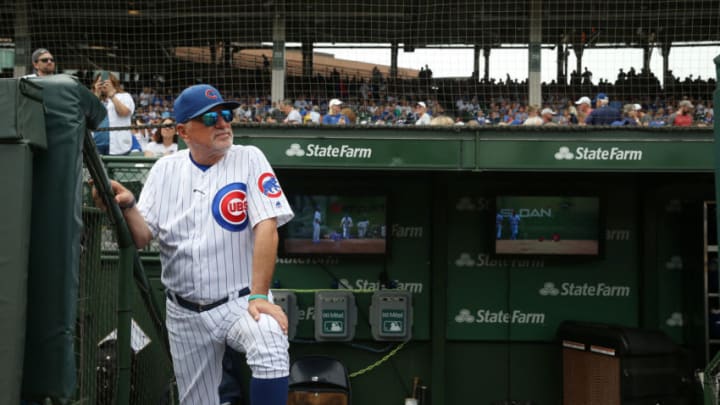The Chicago Cubs manager Joe Maddon will be let go at season’s end for the simplest of reasons: it would not be cost-efficient to re-sign him
Joe Maddon’s career as manager of the Chicago Cubs is almost certainly coming to a conclusion this week in Pittsburgh and St. Louis.
Barring a sudden unexpected development, it appears that when the regular season concludes — or possibly when the Cubs are formally eliminated from contention — Cubs management will announce its intent not to re-sign Maddon. Around Chicago, the assumption is widespread that former Cub David Ross will be named the team’s new manager.
On the game’s periphery, the assumption will be that team President Theo Epstein and general manager Jed Hoyer decided not to renew Maddon’s contract due to frustration with the club’s failure to qualify for post-season play this year. While there remains a mathematical chance of getting the second wild card, the Cubs’ four-game weekend sweep at the hands of the NL Central-leading St. Louis Cardinals substantially reduces the odds of that occurring. Baseball-Reference on Monday adjusted those odds down to 2.5 percent.
More from Call to the Pen
- Philadelphia Phillies, ready for a stretch run, bomb St. Louis Cardinals
- Philadelphia Phillies: The 4 players on the franchise’s Mount Rushmore
- Boston Red Sox fans should be upset over Mookie Betts’ comment
- Analyzing the Boston Red Sox trade for Dave Henderson and Spike Owen
- 2023 MLB postseason likely to have a strange look without Yankees, Red Sox, Cardinals
The reality is that while the Cubs’ failures this season haven’t helped Joe Maddon, they weren’t the deciding factor. As became obvious when Epstein and Hoyer opted not to extend their field manager prior to the start of the 2019 season, the Cubs front office has for some time planned on not renewing Maddon’s deal for the most basic of reasons: money.
Maddon was signed prior to the 2015 season to a five-year contract at $5 million per year. By most standards – and certainly, by Cubs standards – it has been an excellent run. His teams have made post-season play four times, he was named Manager of the Year in 2015, he enters play Monday with a .583 winning percentage in Chicago, and of course, the Chicago Cubs won the 2016 World Series. The last Cub manager who could say that was laid to rest in 1924.
At the time the contract was signed, $5 million per season was excellent money for a field manager, but not unprecedented. Mike Scioscia was paid more than that to manage the Angels.
In the interim, however, the market changed, driven both by an infusion of aggressive new, younger and more data-savvy managerial talent and also by a desire on the part of front offices to exercise greater responsibility for the ways with which those less experienced managers utilize the personnel they are given.
The result last winter was the hiring of six rookie managers, only one of them older than 47, none at a disclosed salary above $1 million. USA Today has reported that more than two-thirds of managers this past season earned less than $1.5 million, while only Maddon, Bruce Bochy, and Terry Francona topped $4 million.
That changing marketplace has substantially altered the face of the modern manager. Among the 30 men managing teams when Maddon debuted with the Cubs, only seven aside from him — Clint Hurdle in Pittsburgh, Bochy in San Francisco, A.J. Hinch in Houston, Bob Melvin in Oakland, Kevin Cash in Tampa Bay, Ned Yost in Kansas City and Francona in Cleveland — remain in control of the same clubs. And both Bochy and Yost have already announced their retirements.
Maddon and Bochy were believed to be the two highest-paid managers in MLB during the 2019 season.
The Chicago Cubs reticence last year to re-sign Joe Maddon, then—and their almost guaranteed decision to walk away now — has a lot less to do with any dissatisfaction over his job performance and a lot more to do with whether, in the changing baseball landscape, the team could acquire roughly equal value for substantially less cost.
It’s not a criticism of Maddon…it’s just business.
